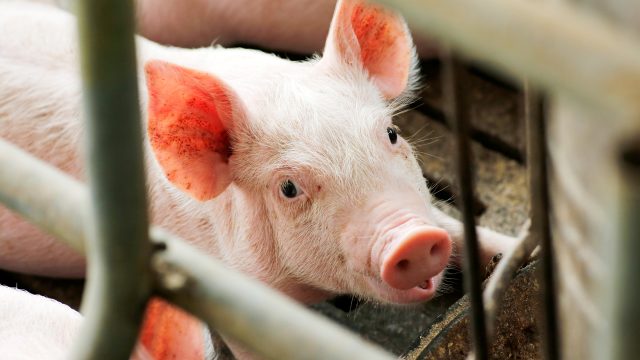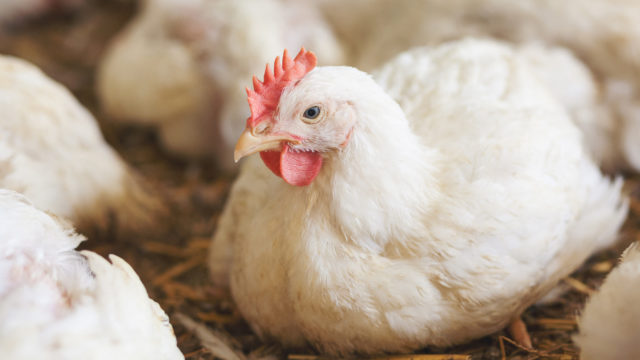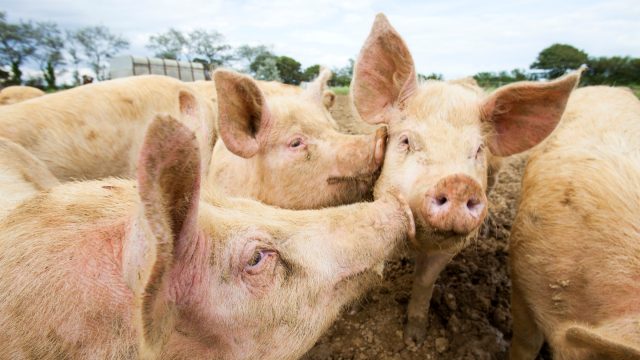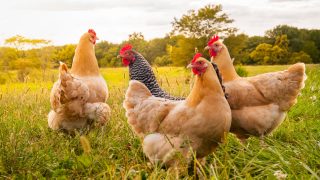
Americans care about animals. That is why, more and more, consumers are demanding better treatment for animals raised for food.
Factory farming is a brutal and cruel industry. Hens used by the egg industry, especially, are subject to almost unimaginable suffering.
Common practices in egg production include intensively confining thousands of hens in industrial barns, debeaking without pain medication, and maceration — referring to the process whereupon male chicks are ground up alive.
These methods are mostly exempt under state anti-cruelty laws as standard agricultural practices.
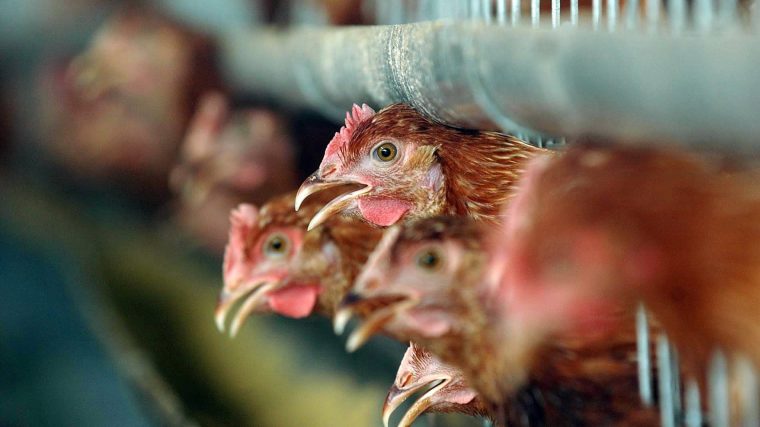
Growing demand for eggs produced in less abusive conditions has led to a proliferation of terms and labels to designed to entice consumers. But these many terms can be confusing — sometimes purposefully so. Additionally, misleading imagery on egg packaging can further confuse shoppers.
That’s why the Animal Legal Defense Fund has put together this guide to the terms that you are likely to see on egg packaging.
It’s aimed at helping you be more informed, and avoid confusion, when you are making your purchasing decisions.
Free Range and Cage Free: These terms refer to the environment in which the hens are housed. The terms does not mean that the hens have been spared some of the egg industry’s worst horrors, like debeaking and maceration.
Free Range: Eggs labeled as “free range” must be produced by hens who have unlimited access to food, water, and access to the outdoors during their egg-laying cycle. These requirements are mandated by the U.S. Department of Agriculture (the USDA). Hens are killed when their egg laying cycles are through.
Cage Free: While hens living in free range facilities must be given access to the outdoors, that is not the case for hens whose eggs will be labeled cage free. The USDA states that eggs labeled as cage free “must be produced by hens housed in a building, room, or enclosed area that allows for unlimited access to food, water, and provides the freedom to roam within the area during the laying cycle.” These hens, too, are killed once their laying cycles are through.
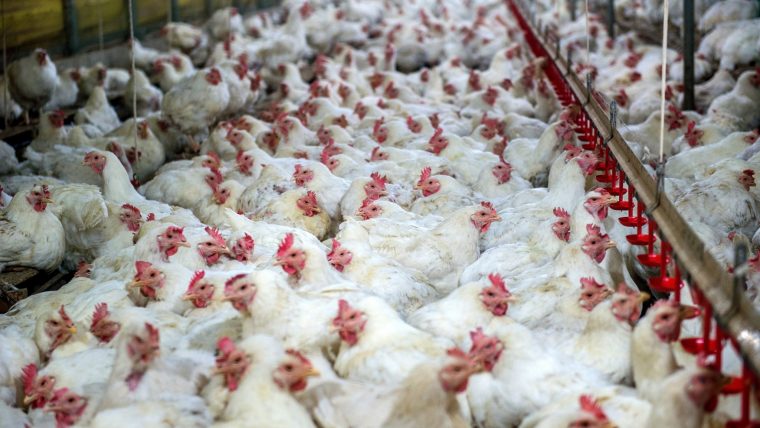
Antibiotic Free and Hormone Free: Consumers may be misled into believing that eggs being labeled as antibiotic free and hormone free were produced in less cruel conditions. But that is not the case. Most eggs in the United States are antibiotic free, since antibiotics decrease egg production, and all eggs are hormone free since it is illegal to give hormones to chickens. In other words, even the most cruelly-produced eggs can be given these labels.
Other Terms: Beware! A number of terms you’ll find on egg cartons sound impressive, as if they signify that hens used by the egg industry have been treated to humane conditions.
But there is no regulatory or policy guidance from the USDA or the Food and Drug Administration, the FDA, regarding many of them.
These include:
- “Pasture Raised”
- “Farm Fresh”
- “Naturally Raised”
- “Animal Friendly”
- “Happy Hens”
Federal Certifications and Seals: The various federal certifications and seals are also deeply misleading.
USDA Organic: A lack of clarity allows producers to exploit the system, letting consumers believe animals have a higher quality of life as part of the increased cost of products.
The USDA’s Organic Program ostensibly requires producers to keep animals in living conditions that “accommodate the health and natural behavior of animals.” This includes “clean water for drinking, and direct sunlight, suitable to the species, its stage of life, the climate, and the environment: Except, that, animals may be temporarily denied access to the outdoors…” Some producers have used this loophole to keep hens indoors most or all of the time in overcrowded barns.
In April 2016, the USDA finalized a rule that would provide clearer animal welfare standards for organic producers which is in the review process. According to the USDA’s own factsheet about the impetus for the new rule, “A lack of clarity in organic livestock and poultry standards has led to inconsistent practices among organic producers.” The rule would require, in part, that producers give animals “daily access to the outdoors and that outdoor areas include vegetation and/or soil.” It also would set a minimum required amount of indoors space for chickens, prohibit forced molting, place restrictions on the use of artificial light and the amount of ammonia in the air, and require perching space for hens indoors.
In March 2018, the Trump administration withdrew the proposed rule, but it was reinstated by the Biden administration. While the rule is reviewed, eggs labeled as organic can continue to come from facilities that may fall well below the animal welfare standards the average shopper associates with the term “organic.”
USDA Process Verified Program: The USDA Process Verified Program is a voluntary program that producers may participate in for a fee. Companies can state they are “USDA Process Verified” as to any number of production claims, including hen welfare claims. However, the USDA has not established guidelines for evaluating claims.
Private Certification Programs: Some egg producers voluntarily participate in private certification programs.
Below is a brief description of each program. These are provided for educational purposes and should not be construed as an endorsement by the Animal Legal Defense Fund.
“United Egg Producers Certified” is a voluntary program developed by United Egg Producers, an industry trade group that represents 90% of eggs produced in the United States. It exists to certify standard industry practices like intensive confinement. It recommends debeaking and forced molting by reducing protein intake and lighting.
“Certified Humane” is a voluntary fee-based certification that does not require hens to have access to the outdoors. Debeaking without pain killers is permitted.
“American Humane Certified” is a voluntary fee-based certification that does not require hens to have access to the outdoors. Debeaking without pain killers is permitted.
“Animal Welfare Approved” is a voluntary free certification and sets the highest standard for the treatment of hens used by the egg industry. It requires hens be given access to pasture, nest boxes, dust baths, and prohibits debeaking. It permits the killing of male chicks.
Focus Area
How We Work
Related
-
U.S. Supreme Court Declines Review of California’s Landmark Proposition 12 Animal Cruelty Law
The Animal Legal Defense Fund helps protect the strongest farmed animal protection law in the countryJuly 2, 2025 News -
Settlement Reached in California Water Use Lawsuit against Foster Poultry Farms
Foster Poultry Farms agrees to improve water conservation and animal welfare at its Livingston, California poultry-processing plantApril 21, 2025 Press Release -
Fourth Circuit Enjoins North Carolina Ag-Gag Law
The U.S. Court of Appeals for the Fourth Circuit handed an important win to plaintiffs in a lawsuit challenging North Carolina’s Ag-Gag law, ruling that undercover investigations and whistleblowing are considered newsgathering activities protected by the First Amendment.February 23, 2023 Press Release

